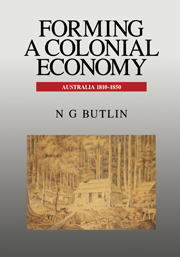Book contents
- Frontmatter
- Contents
- List of Tables
- List of Figures
- Acknowledgements
- Part I Forming an Economy
- Part II The Colonial Peopling of Australia: 1788–1850
- Part III Public Funding of Colonial Development: 1788–1850
- 5 Introduction
- 6 British Fiscal Characteristics
- 7 The Imperial Fisc in NSW and Van Diemen's Land to 1821
- 8 Broad Relations between British and Australian Fiscs to 1821
- 9 The Beginning of Local Budgeting: Real and Subterranean Budgets
- 10 The Conventional Legal Fisc in NSW: 1822–50
- Part IV The Colonial Australian Economy 1810–1840—A Historical, Statistical and Analytical Account
- Bibliography
- Appendixes
- Index
5 - Introduction
from Part III - Public Funding of Colonial Development: 1788–1850
Published online by Cambridge University Press: 04 August 2010
- Frontmatter
- Contents
- List of Tables
- List of Figures
- Acknowledgements
- Part I Forming an Economy
- Part II The Colonial Peopling of Australia: 1788–1850
- Part III Public Funding of Colonial Development: 1788–1850
- 5 Introduction
- 6 British Fiscal Characteristics
- 7 The Imperial Fisc in NSW and Van Diemen's Land to 1821
- 8 Broad Relations between British and Australian Fiscs to 1821
- 9 The Beginning of Local Budgeting: Real and Subterranean Budgets
- 10 The Conventional Legal Fisc in NSW: 1822–50
- Part IV The Colonial Australian Economy 1810–1840—A Historical, Statistical and Analytical Account
- Bibliography
- Appendixes
- Index
Summary
The British convict settlement of Australia represented a major act of public investment. This is not to imply that it was consciously perceived as such, carefully designed or well directed. On the contrary. Nevertheless, the rate of return on British public expenditures — effectively capital transfers to the colonies — became a prominent matter during the 30 years after the first settlement. A widely debated question developed and continues to today: Was there a net benefit to Britain in convict transportation as compared with retaining convicts at home?
Large and often undesigned public outlays were made by Britain during more than 60 years in the transfer of unfree persons and on goods and equipment to sustain the occupation of Australia during formative years and to give initial support to successive convict shipments. This was not confined to the convict settlements and some public British subsidies were rendered to the free corporate colonies that developed from 1829. But these latter subsidies were tiny compared with the capital transfers to the convict settlements. The early occupation of Australia began and was sustained as an extension of the British ‘budget’ (even though the modern concept of a centralised budget was not clearly established until well into the 19th century).
- Type
- Chapter
- Information
- Forming a Colonial EconomyAustralia 1810–1850, pp. 54 - 56Publisher: Cambridge University PressPrint publication year: 1994



